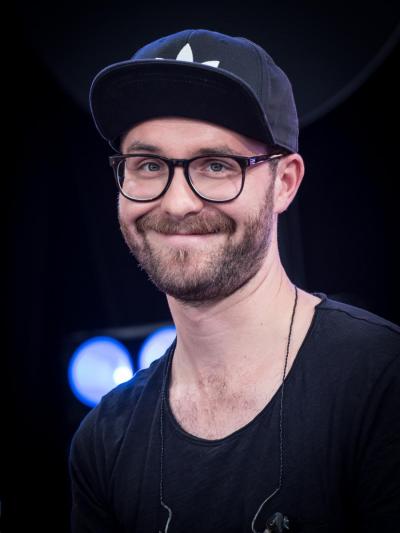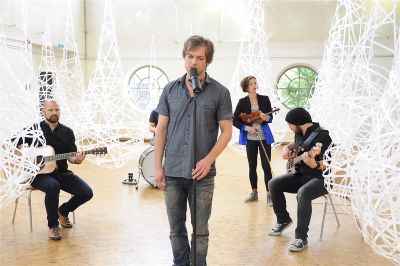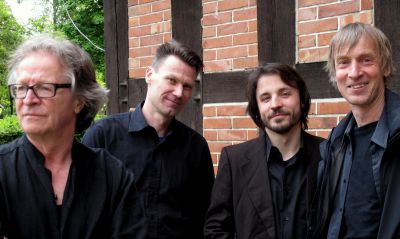Mark Forster: A superstar with Polish roots

“[In Germany] it is more uncool to be half Polish than half Spanish or half French”, confessed Mark Forster in an interview[1]. The singer, who was born Mark Ćwiertnia in Kaiserslautern on 11 January 1983, recalls how he was confronted with this type of stereotypical attribution in the past. Today, he considers growing up in two cultures an advantage and speaks openly about the fact that he feels both German and Polish.
Music has always been Mark’s passion but, for a long time, there was no real sign that the young boy’s hobby would become his vocation. Forster grew up in Winnweiler in Rheinland-Pfalz, where he lived with his Polish mother, his German father and his younger sister. He also attended the grammar school there and gave his first concerts at which he and his peers only played his own compositions. He has always been keen to point out that covering songs in clubs has never interested him. After his A-levels, Forster moved to Mainz to study law but that subject proved a poor choice and, after four semesters, he gave it up to switch to business administration. He then successfully completed his business administration degree but did not go on to work in this field. After moving to Berlin, he initially composed jingles and soundtracks for various TV formats. During this period, he talent was discovered by Kurt Krömer, the well known German comedian. He suggested that Forster work with him on his stage show. From then on, Forster accompanied Krömer as the “Polish pianist“ at his live appearances throughout Germany. In an interview for the Deutsche Welle, the musician talked about this period: “I appeared as the Polish Balboa. In the band, I was the bloke who never understood what was said to him and always played something other than what the frontman wanted him to play. It was entertaining but it was also an insightful experience that I was able to use for my work on stage and on television”.[2]
After some time, when Mark was no longer satisfied with working as Kurt Krömer’s sidekick, he began to write his own songs and took his first steps towards becoming a solo artist in showbusiness. In the beginning, he performed under his family name Ćwiertnia, but very quickly realised that the Polish surname was a bit of a tongue twister for Germans. He owes his stage name to chance: one day a representative from a record label came to his recording studio in Forster-Straße and wrote the young artist’s telephone number down under the name “Mark Forster”. Shortly after this, the musician’s career began to take off, which placed Forster in a dilemma: on the one hand, he earnt good money from his work on Kurt Krömer’s TV programme but, on the other hand, his desire to concentrate on his own creative work was getting stronger and stronger. During this phase of indecision, Forster went on the Camino de Santiago which helped him make his mind up. After much reflection, the singer decided to give up his job in television and to work as a composer performing his own songs. It didn’t take long to show just what a good decision this was.
In 2010, Mark Forster signed a contract with the Four Music label, founded by the cult band Die Fantastischen Vier, and this label was to produce his début album. His first single “Auf dem Weg” appeared in May 2012 and quickly became a hit. The album “Karton”, which was brought out two months later, was also successful and awarded a Goldene Schallplatte. A year later, the rapper Sido released the single “Einer dieser Steine” with Mark Forster contributing the chorus. The title climbed up the charts and into the “Top Ten” in Germany and in Switzerland. Mark Forster was becoming more and more well known. Soon afterwards, the rapper returned the favour by guest singing on Forster’s song “Au revoir”, which announced Mark’s second album “Bauch und Kopf” (2014). The single reached number two in the charts and collected three Goldene Schallplatten. Quite unexpectedly, Lukas Podolski played a part in the popularity of this song by playing it to his teammates during the World Cup in Brazil. The song was then used as the warm-up song before every game and became the unofficial anthem of the national team. After the German team went on to win the World Cup, “Au revoir” became the most listened to song on Soundcloud. Over a million singles were sold and earnt Forster the Deutscher Musikautorenpreis.
[1] Linda Zervakis, episode of the podcast “Gute Deutsche” entitled Mark Forster und seine polnischen Wurzeln, Spotify, 20/7/2020.
[2] Maciej Wiśniewski, Niemiecka supergwiazda: Czekam na zaproszenie z Polski (German superstar: I’m waiting for an invitation from Poland). In: “Deutsche Welle”, 20/3/2016, online: https://www.dw.com/pl/niemiecka-supergwiazda-czekam-na-zaproszenie-z-po… (last accessed on 3/6/2021).


